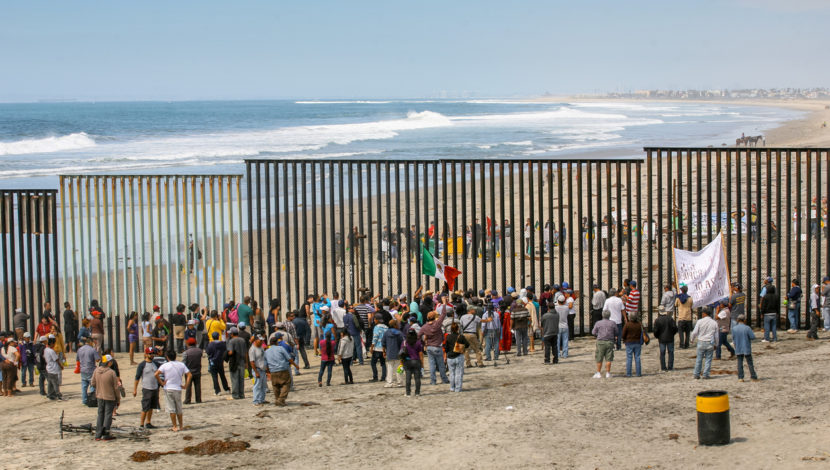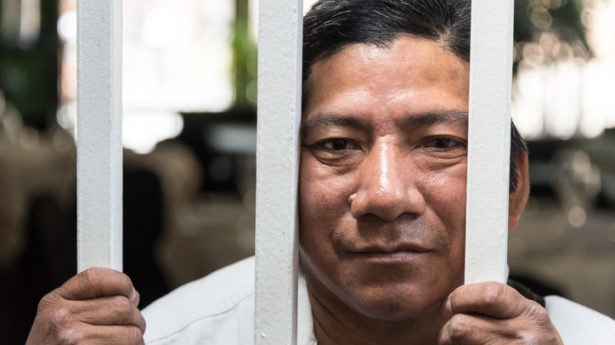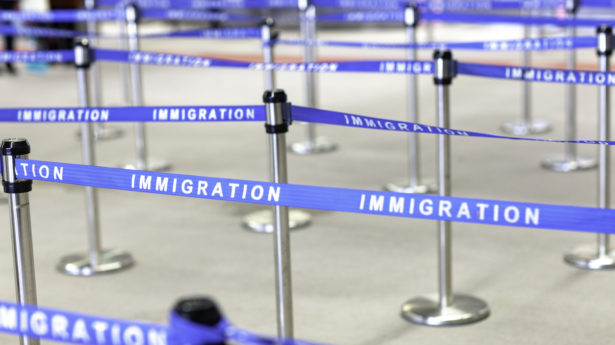The Unitarian Universalist Service Committee advances human rights through grassroots collaborations.
5 Frightening Facts About “Remain in Mexico” Program for Asylum-Seekers

By on January 28, 2020
While the construction of Trump’s physical border wall has been largely impeded, his administration’s invisible wall to keep people from gaining asylum in the U.S. has been disastrously effective. One of the largest bricks in that wall has been the “Remain in Mexico” program, which hits its one-year mark on Wednesday, January 29.
More than 57,000 people seeking asylum—including 16,000 children and hundreds of babies under one year old—have been returned to Mexico to await their U.S. immigration court hearings after turning themselves in at the border to request protection. Not only does this make it extremely difficult to find a lawyer or prepare an asylum case—it also forces asylum-seekers to live in terrible conditions and face extreme dangers for months while they wait.
The cruelly ironic official title of the program, “Migrant Protection Protocols” (known as MPP), describes the exact opposite of what it does. A campaign working to monitor MPP, Delivered to Danger, has tracked more than 650 cases of murder, rape, kidnapping, and other violence against those sent back to Mexico while awaiting court.
Here are five important but little-known facts about the MPP program and the way it violates human rights:
1. Only 0.1 percent of the asylum-seekers sent back to Mexico through MPP who have gone to court have actually won their cases (one out of every 1,000), and only 4 percent have had lawyers to represent them.
Only 11 people had been granted asylum out of nearly 10,000 cases heard by immigration judges by December 2019. This compares to an overall 35 percent asylum approval rate (the latest annual data is from 2018) for cases heard from people inside the United States, including both those free and detained. This is due to a variety of factors including the many barriers to working with a U.S.-based immigration lawyer from Mexico, how difficult it is to prepare evidence for an asylum case without stable housing or communication, and politically appointed judges with very high denial rates.
2. MPP asylum cases are heard in giant tent courts, by judges presiding over video, and public witnesses are not allowed in as required by U.S. law.
On the day of their hearings, asylum-seekers under MPP must go to the border port-of-entry at 4 a.m., where they are transported to remote makeshift courts built out of tents and shipping containers. Once there, their cases are heard over video conferences by judges hundreds of miles away. These tent courts cost at least $155 million dollars in 2019. Typical immigration courts in the United States are open to the public, but these ad-hoc MPP courts do not allow witnesses, making community oversight and accountability impossible. Even worse, those who seek asylum at the Arizona border are sent to Nogales-Sonor and expected to make it to court in El Paso, Texas—more than 300 miles away.
3. “Remain in Mexico” (MPP) is leading to a new rise in family separations.
It is a blatant lie that family separation at the border ended in the fall of 2018, and while the news headlines have moved on, families continue to suffer. Adult family members who aren’t biological parents—for example, grandparents, aunts and uncles, or adult siblings—routinely have children removed from them. Now, the children go to unaccompanied minors shelters while, most often, their adult caretaker is sent back to Mexico through MPP, with no idea how to find or communicate with the child. Parents are still having their children removed and then are sent back to Mexico through MPP, often based on unreliable information or criminal histories that have nothing to do with children. Not only that—as winter hits and families sent with children back to Mexico through MPP sleep in makeshift tent cities at the border, desperate parents are beginning to opt to send their children alone to the border, especially if they have become seriously ill or endangered, hoping this may save their lives.
4. There is no coordinated government or United Nations aid response to the unofficial tent cities forming on the Mexico side of the border.
Despite the fact that the poor conditions in the tent camps at the U.S.-Mexico border have been compared to those in Somalia and Syria, there has been no coordinated response from the United Nations High Commissioner for Refugees (UNHCR), no UN humanitarian aid workers deployed, and no distribution of emergency supplies such as food or bedding. Since the U.N. relies on U.S. funding for refugee aid, they may feel that their hands are tied politically. The Mexican government has sent military and National Guard troops, and some municipalities have opted to open shelters, but otherwise has also failed to respond to meet humanitarian needs. As a result, most camps are self-organized among those living in them and rely for basic necessities on a patchwork of under-funded, non-governmental, and volunteer efforts.
5. The U.S. government is appealing every asylum case that wins in the MPP courts, and often sends asylum-seekers who have won back to Mexico illegally with false court dates on their documents.
Even though well under 1 percent of those sent back through Remain in Mexico are winning their asylum cases in the MPP tent courts, the U.S. government is appealing the handful of cases that have won.That means that rather than being freed into the United States with asylum granted, people who have won their case are either held in detention through the appeals process, which could be months, or are sent back to Mexico again—after winning asylum. Since it violates even MPP’s own rules to send people back to Mexico who don’t have a pending court date, U.S. border agents are issuing legal documents, known as “notices to appear,” with fake court dates, in order to force Mexico to take them.
*
Although the situation is dire, the U.S. Congress is at least beginning to pay attention, and Democrats in the House Judiciary Committee have launched an investigation into the program. Certain MPP tent courts, though not all of them, are now being opened to the public and the press, which will enable more community oversight.
One of the strongest weapons we have against Remain in Mexico is the funding that keeps it alive—which is why we are calling on you to take action in support of the House’s Asylum Seeker Protection Act, which would de-fund the program and therefore end it. A companion bill still needs to be introduced in the Senate. Please join us for the #Faith4Asylum National Day of Action on January 29.
Photo Credit: iStock – Photo Beto
***
About UUSC: Guided by the belief that all people have inherent worth and dignity, UUSC advances human rights globally by partnering with affected communities who are confronting injustice, mobilizing to challenge oppressive systems, and inspiring and sustaining spiritually grounded activism for justice. We invite you to join us in this journey toward realizing a better future!

